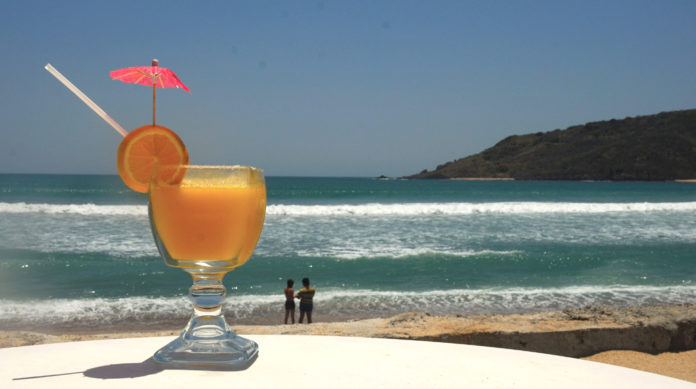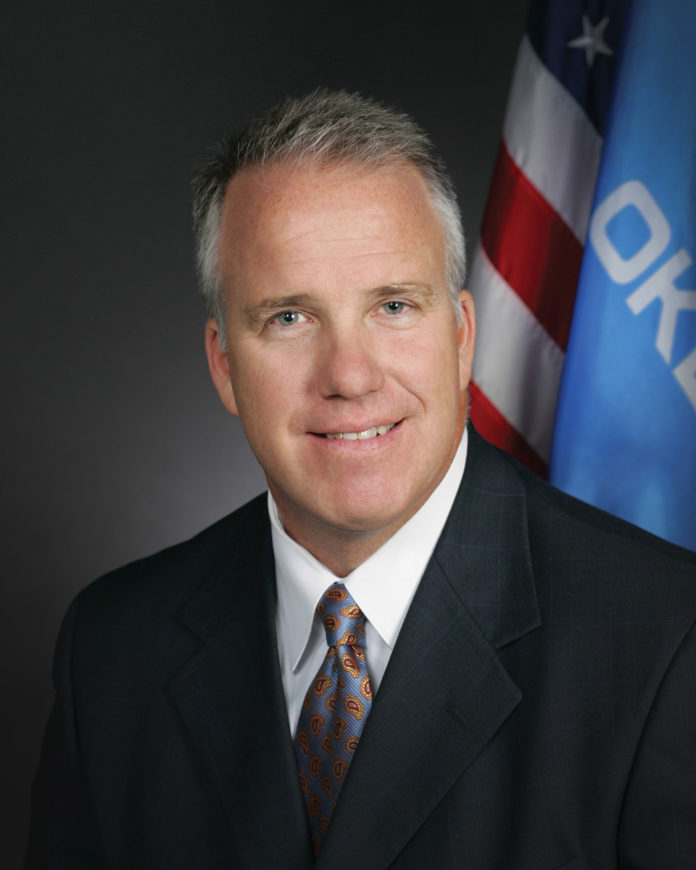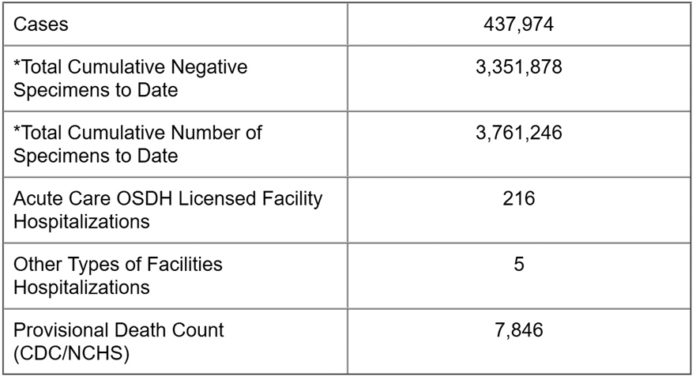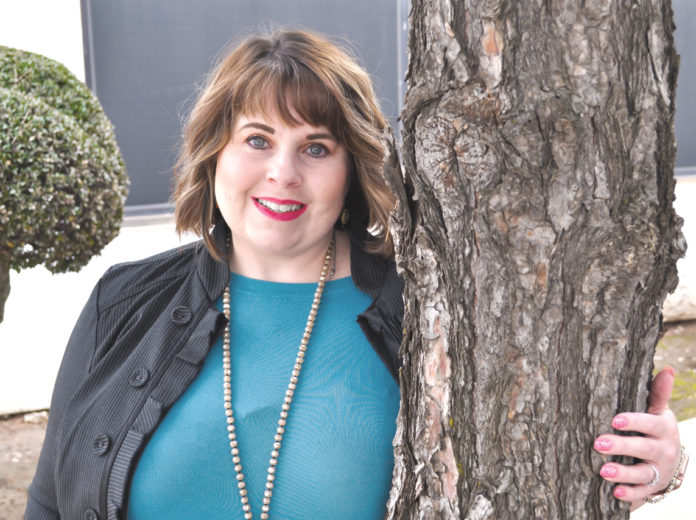The University of Oklahoma College of Medicine has been named one of the best medical colleges in the nation in several categories, according to the U.S. News & World Report 2022 Best Graduate Schools rankings. They include primary care education; most graduates practicing in primary care fields; most graduates practicing in rural areas; and most graduates practicing in health professional shortage areas.
The OU College of Medicine is the largest college within the OU Health Sciences Center and is at the center of OU Health, the state’s comprehensive academic health system. The rankings, released March 30, cite the OU College of Medicine as 51st in the nation for excellence in primary care education, which includes the medical specialties of family medicine, internal medicine and pediatrics. The college ranks 60th in the nation for the number of graduates practicing in primary care fields; 44th in the nation for graduates practicing in rural areas; and 44th in the nation for graduates practicing in health professional shortage areas. In addition, the college ranks 74th for its research activity.
The rankings encompass 191 accredited allopathic and osteopathic medical schools in the United States, which grant M.D. and D.O. degrees, respectively.
The OU College of Medicine’s rankings underscore its commitment to training the next generation of physicians who will care for patients across the spectrum of life, focusing both on the prevention and treatment of disease, as well as leveraging research to continually improve the standard of care, said John Zubialde, M.D., Executive Dean of the OU College of Medicine.
“We are excited about the U.S. News & World Report rankings because they reflect the hard work of our faculty and staff in educating the physicians of tomorrow,” Zubialde said. “Our ranking in primary care is particularly significant given the breadth of our college departments, which range from primary care to specialty care. Whereas many other medical schools have a singular focus on primary care, our primary care disciplines excel alongside our specialty programs because of the high caliber of our physicians and staff. Each day they are committed to training Oklahoma’s healthcare workforce.”
The OU College of Medicine trains the majority of physicians in Oklahoma, including the most primary care physicians. Many choose to practice medicine in rural and medically underserved areas of the state, where access to services is critical for improving health. The college is also committed to diversity among its students and future physicians – through the Office of Diversity, Inclusion and Community Engagement, students from underrepresented populations across Oklahoma are mentored as they prepare to apply to medical school. Many of those students will choose a career in primary care and will return to their communities to practice medicine.
The college’s ranking in research activity reflects the faculty’s ability to earn federal research grants. Faculty members across the college’s 21 academic departments regularly earn grants from the National Institutes of Health, the U.S. Health Services & Resources Administration, the U.S. Department of Defense, and others. In recent years, the college’s major federal grants include $11 million to create the Oklahoma Center for Microbial Pathogenesis and Immunity, a hub for research into many types of infections and the immune system response, as well as $38 million for suicide prevention research.
“Along with education and patient care, research is a primary mission of the OU College of Medicine,” Zubialde said. “Our faculty members’ success in earning federal grants signifies the value of their research and its potential to improve the practice of medicine. By training in that environment, our students understand that our role is not only to offer high-quality care to our patients, but to define the next standard of care through research discoveries.”
The OU College of Medicine’s main campus is in Oklahoma City at the OU Health Sciences Center, and it has a four-year branch campus in Tulsa, the OU-TU School of Community Medicine. Each year, the college admits approximately 165 students into its four-year program. Since the founding of the OU College of Medicine in 1910, it has awarded the Doctor of Medicine degree to more than 10,000 graduates, many of whom stay on campus for their primary care residency. In addition, the college is the largest educator of physician assistant students in the state, providing approximately 75 new PAs annually.
Students on both campuses train in OU Health outpatient clinics and hospitals and in community settings, where they cultivate the tools to treat patients with a wide range of diseases, from chronic conditions like high blood pressure and diabetes to acute illnesses. Primary care physicians provide much of the healthcare that patients need, and they determine when their patients need to be referred to a specialist.
“For well over a century, OU doctors and health professionals have provided essential care to generations of Oklahomans, fulfilling our university’s core purpose of changing lives,” said OU President Joseph Harroz Jr. “It is incredibly gratifying to see our College of Medicine earn national recognition that reflects our longstanding legacy of training future physicians to advance health with skill, innovation and compassion. As we launch OU Health, this recognition speaks volumes to the future impact we are prepared to have on the health of our state.”
To compile its rankings, the U.S. News & World Report uses several indicators, including an overall quality assessment, students’ grade point average, score on the Medical College Admission Test (MCAT) and college acceptance rates. It also includes a peer assessment score, a residency assessment score, and resources allotted to faculty. The data for the rankings come from statistical surveys of more than 2,012 programs and from reputation surveys sent to more than 20,500 academics and professionals, conducted in fall 2020 and early 2021.
U.S. News & World Report Ranks OU College of Medicine One of Nation’s Best in Several Areas
Mayor of Choctaw Appreciates Early Mentor’s Help
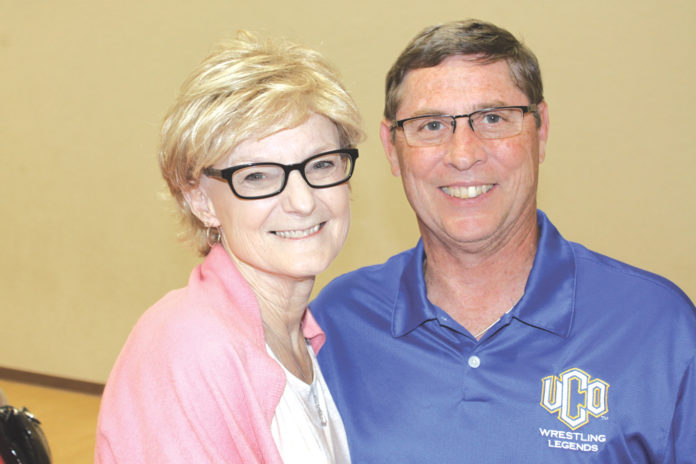
Story by Darl Devault, Feature Writer
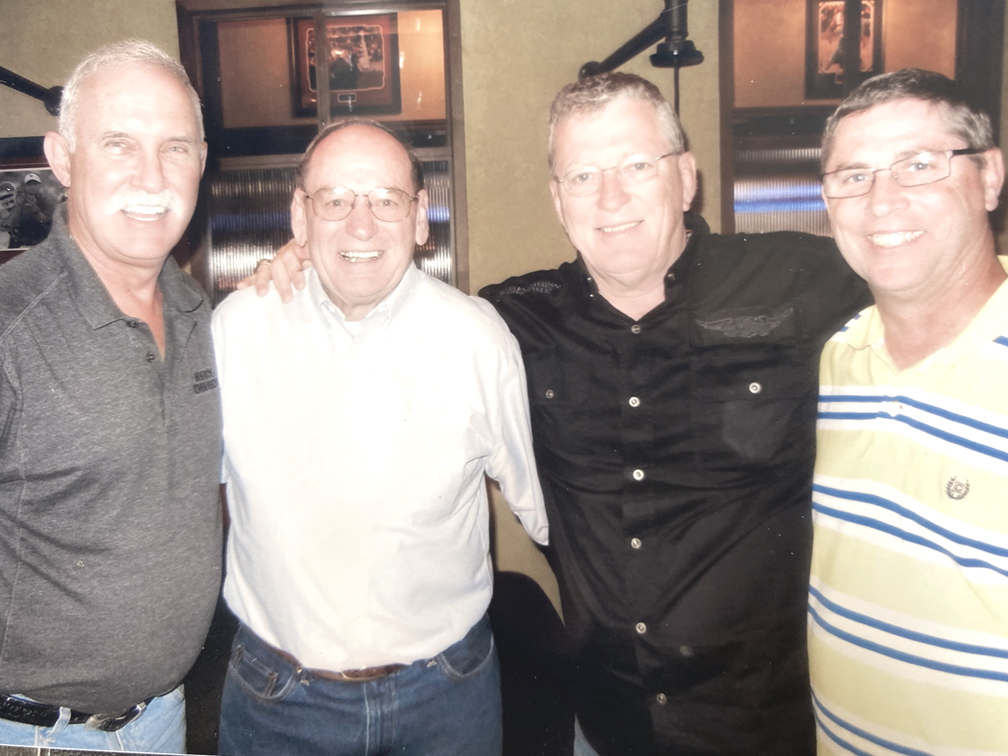
Randy Ross, 66, says as the mayor of Choctaw and the executive director of the Oklahoma Accountancy Board his life’s outlook was shaped 50 years ago by an important coach.
“I started wrestling when I was 9 years old in the fourth grade,” Ross said. “Compared to a lot of kids I won far more than I lost, but I never achieved my goal of a state championship in high school at Midwest City, ending up as a State Runner-up. But I won more when I got to college. including becoming the first All-American in modern times at Central State University (now the University of Central Oklahoma).”
What he also gained from those hours spent in the wrestling room is something not measured by wins or medals, but instead by learning important life lessons lasting forever, he said.
He has been called chairman, president, mayor and many other titles in different organizations. Those titles come and go, but one thing never changes—he can say “I am a wrestler.”
“I learned the discipline necessary to study for and pass the CPA exam from wrestling,” Ross said. “I learned to persevere through difficult times, through tragedies, through the highs and lows of life, to take the next step.”
His high school wrestling coach, Jim Kinyon, made a significant impact on Ross’ life on his way to coaching Midwest City High School wrestlers to the school’s first wrestling state championship 50 years ago in 1971 and again in 1972.
Coach Kinyon taught them the skills and techniques required to be successful on the mat. “Important to my future and who I am today he also understood as a coach of impressionable young men he had an opportunity to instill character traits to last a lifetime,” Ross said.
“My successes in life and my career are founded on the lessons the great sport of wrestling gave me,” Ross said. “In my career, I have fought the battles in board rooms, managed the tough political campaigns. I have weathered the insults from fans as I officiated matches. A coach or two might have had choice comments, but wrestling gave me the tools to handle mentally and physically whatever was tossed at me.”
Kinyon died in 2016, but his legacy has lived on among the hundreds of lives he positively affected through the sport of wrestling. Ross says these are the life lessons he modelled for his athletes.
Be Humble and Keep Working
There is no bigger test than competing in one-on-one physical combat. But unless you are a world-beater, there will always be someone better than you. Kinyon helped Ross make the choice to go on to compete in college.
Success in wrestling is directly proportional to the amount of training you undergo. Being physically talented is one thing, but often the outcome of a match is decided by which athlete has put more work into practice and conditioning. There is no substitute for hard work, an important lesson which helps post-wrestling. Without Kinyon’s early guidance Ross says he would not have likely been elected to the Oklahoma Chapter of the National Wrestling Hall of Fame in 2017.
Accountability
Wrestling is an individual sport, so accountability is everything. Wrestling is also a team sport as points are awarded at each weight class based on who won each match and by how much. After a wrestling meet the total team points decides the team victory or loss.
After weigh-in before a tourney Kinyon would go over this information with each Bomber wrestler. He explained what to expect from their opponent. Once he got to the end of the weights, he would add up the points each wrestler would likely earn. He then told the team what we needed to do to win the tournament.
This ability to use figures to give others confidence in what they are doing may well be the reason he became an accountant at UCO.
Mental toughness is as important as physical strength.
Ross was injured in a car accident in high school. Coach Kinyon worked with him create the mental toughness needed to continue to perform.
“An example of this is two days before the 1972 state tournament I came down with an intestinal bacterial infection,” Ross said. “I did not practice the next day, laid up in bed. That night Kinyon came to my house and took me to the high school to weigh. I was a couple of pounds over my 106-pound weight class. Kinyon told me what to eat and they would be by to pick me up for weigh-in the next day.”
Ross offered to let Gus Blackwell wrestle in his place, but Kinyon said “No, you helped us get this far, and if you can walk, you are going to wrestle.”
Ross took second place in the tourney, helping the team to a second consecutive state championship.
“Coach Kinyon taught me even more important than physical strength is your attitude,” Ross said. “If you allow it to, your mind will almost always give up before your body. Wrestling not only works the body but the mental aspect and controlling emotions before and during a match is a key to success and later life.”
Confidence Through Preparation
Kinyon was known for his calm demeanor during matches, often appearing as an observer, like the fans. This special mix of strong teaching skills and high-performance standards won him honors as a coach. Only coaching at Midwest City for four years, 1969-1972, Kinyon was named 1971 and 1972 Oklahoma Class 4-A wrestling coach of the year.
“I never won a state championship, the kids won the state championships,” Kinyon said in 1995. “Wrestling is a game of skills. The guy with the best skills is usually the guy who wins. If it were just strength, then all your big football players would be great wrestlers. But it is a game of skills. Once you master those skills it just comes natural to you.”
Asked to compare his mat side coaching style to his rivals Kinyon said he felt the other coaches tried a little too hard to coach during the match because they felt helpless themselves about the outcome.
“It is out of your control (once the match begins)—if you haven’t done a good job of teaching… then your athletes are in trouble,” Kinyon said in 1995. “Where you win you dual is on Monday, Tuesday and Wednesday… on Thursday you lighten up a little bit, then you make weight, and you are ready for the match. The coaching is done. If you have to coach a guy—you can give him some pointers, but the real coaching is done in the practice room.”
“Once I graduated from college, I found this same mentality can be taken into any group or work setting,” Ross said. “Learning to properly prepare for any situation is extremely valuable.”
Discipline
Wrestling is a lifestyle. It requires dedication and discipline away from the mat, especially when it comes to diet and nutrition.
Nothing will tax your body more than a wrestling match and any deficiencies in your diet will affect your performance. Wrestling also requires the discipline to put in the extra 6 a.m. run or after-practice weight session if you want to be successful.
“My interaction with coach Kinyon rewarded me with exposure to all these qualities,” Ross said. “They helped spark my college studies and wrestling career to remain with me throughout my life. This preparation in life has allowed me to handle the many ways I have been stretched serving the citizens as a public figure while being the mayor of Choctaw.”
TRAVEL / ENTERTAINMENT: Discovering Mazatlán , Mexico
Photography and Text by Terry “Travels with Terry” Zinn [email protected]

“Travel is the truest form of education,” – Shirley MacLaine
For years I had heard of Mazatlán, Mexico, and yet not knowing much about it, I decided it was time I was educated by traveling and discovering their eateries. (As with all travel these days double check Covid restrictions with hotels and airlines. If things have not opened up yet, this might just go on your bucket list.)
Mazatlán is a West Coast Mexican resort town, which was never planned as a resort town. It has all the qualities needed for such: a developed 13 mile Malecon, or promenade, (http://www.discoverymexico.com/mazatlan/guides/mazatlan-malecon) along a picturesque ocean front bay, mid to upscale resorts and many dining opportunities.
My Oasis was the Pueblo Bonita Mazatlán (http://www.pueblobonito-mazatlan.com) an all-inclusive hotel on bustling, Camaron Sabalo avenue, where the traffic competed for audio pleasure in my room with the relaxing swoosh of the surf. I would have changed my room location away from the traffic, but the view of the bay and pools were too outstanding. An all-inclusive hotel option can be your ticket to ease, but sometimes it’s popularity causes delays in seating where no reservations are taken. The popular Bonita hotel chain has a newer property slightly up north on Emerald Bay, which needs exploring.
My stay included an itinerary of many fine eateries in a variety of atmospheres but all with attentive service and with a specialty of Mazatlán fresh sea food.
Costa Marinera Restaurant (https://www.zonaturistica.com/restaurante/251/la-costa-marinera-mazatlan.html), is right around the corner from my stay at the Pueblo Bonita Mazatlán hotel, and has an open air dining option overlooking the bay, with wandering musicians (singer Ernesto Sudea was a favorite) and attentive service. As with many Mazatlán restaurants they offered a variety of breaded shrimp, on a seafood platter of Lobster, Tuna, Octopus, Mahi Mahi and my favorite at all the eateries, fresh Guacamole. I was introduced to Toni Col (emobtell adori) a non-carbonated vanilla coke concoction with a distant taste of Coca Cola.
Mazatlán, I am told, means Land of the Deer. One of the off shore islands is named Deer Island. You can enjoy a slow boat ride around the bay and a stop off at Deer Island, where a casual lunch and open bar, might tempt you away from the banana boat and kayaking activities. With sand between your toes under the shade of a palapa, a cool drink in hand, and views of the Mazatlán hotels across the water, it makes for a relaxing adventure. (http://www.mazatlantours.org/kolonahe-catamaran-deer-island.htm)
Panama, with several locations, was my favorite of all the dining options. Here I had a comfort breakfast of egg over easy, potato frites, a crisp Belgian waffle topped with fruit and a heavenly syrup, accompanied by iced tea – it was a satisfying wakeup. The pastries in the shop in the front of the modern clean and uncluttered décor of the restaurant were tempting and looked too good to eat. Be sure and ask for the menu in English.
Also relatively close to the Pueblo Bonita Mazatlán hotel is the new La Mazetleca (http://www.lamazatleca.com) seafood restaurant. Weather permitting you can be seated at their sandy outdoor terrace overlooking the crashing surf. With a Mango Margarita, the sun, the breeze, and good company, what more do you need? I enjoyed a salmon with sunset sauce, ~ a refreshing fruity compote. La Mazetleca offers a number of exotic and visually stunning seafood dishes to explore. If outside seating is not an option, the interior has expansive windows toward the surf and video screens for passing the time.
On my departing evening my hosts arranged for a tour of the seaside night life along the coastal road after sunset aboard the signature Pulmonias. Pulmonias are an adoption of a golf cart with open air seating. The story goes that when first introduced this touristy transportation was in competition with local taxis. The taxis warned that you could catch cold or pneumonia riding in this open air motorized cars, thus the nickname Pulmonias. Pulmonias are only used in Mazatlán and have become its trademark image.
The farewell dinner was at the El Presidio, a gourmet restaurant in the Historic District. Here the charming atmosphere of a semi open air interior exposed brick courtyard transformed from reuse of an old house and factory, made for an exotic and memorable evening. In fact the atmosphere out did the gourmet food. The congenital wait staff followed my instructions explicitly and made me the best traditional Martini I had during my stay. It would have been easy to order another Mango Margarita but requesting a well-made simple Martini is a real test for any gourmet restaurant and El Presidio measured up.
My stay was too short, but you may also enjoy the expansive market downtown which has everything from souvenirs, table coverings, religions artifacts, fruits, vegetables, meats, seafood and leather goods among its many stalls.
Traveling is not only educational and of course enjoyable, but with a destination like Mazatlán, you may have discovered your favorite Mexican resort. There are a limited number of nonstop airline flights from a variety of United States gateways. Explore: http://www.gomazatlan.com
Mr. Terry Zinn – Travel Editor
Past President: International Food Wine and Travel Writers Association
3110 N.W. 15 Street – Oklahoma City, OK 73107
https://realtraveladventures.com/?s=terry+zinn
https://realtraveladventures.com/?s=zinn
http://new.okveterannews.com/?s=TERRY+ZINN
www.martinitravels.com
Get Ready for COVID-19 Vaccines: Insurance Coverage and Misinformation
Thanks to the Oklahoma State Department of Health (OSDH) and all the front-line workers, Oklahoma has now entered Phase 4 of its vaccine distribution plan. With three COVID-19 vaccines available, all Oklahomans are now eligible for vaccination. As we’re on track to get our “normal” back, I’d like to remind you that the cost of obtaining a vaccine will not be a barrier for Oklahomans, regardless of health insurance status.
The Coronavirus Aid, Relief and Economic Security (CARES) Act, provides funding for the vaccine itself. It also requires most health insurance companies to cover qualifying coronavirus preventive services without imposing any cost-sharing requirements, such as a copay, coinsurance or deductible. If you are covered under Medicare or Medicaid, your vaccine will be paid for by the Medicare’s trust fund. If you don’t have insurance, your vaccine is still covered. Healthcare providers will get reimbursed through the Provider Relief Fund.
If you received an unexpected bill for a COVID-19 vaccine or qualifying associated visit, you should contact the provider or your insurance company and alert them of the error. If you have issues with your health insurance company regarding a bill related to COVID-19, please file a complaint with the Oklahoma Insurance Department (OID) at www.oid.ok.gov/ or contact the Consumer Assistant at 800-522-0071. Also, here are some key takeaways to avoid fraud related to COVID-19 vaccines.
You don’t need to pay to get a COVID-19 vaccine appointment. Visit the OSDH’s website to make your appointment. You can also ask your doctor or provider how to get the vaccine near where you live.
Getting a COVID-19 vaccine is free. Whether you have health insurance or not, the vaccines are always free. Providers can seek reimbursement from your insurance company, but there are no co-pays or cost-sharing. If you’re asked to pay money, contact the OID at 800-522-0071.
You cannot buy a COVID-19 vaccine. Please do not fall for the ads that come via email or pop up on your social media feed offering early access to a vaccine. The vaccine is available only at federal and state-approved locations.
Vaccinations will not impact your life insurance benefits. Life insurance policies clearly spell out what might cause your insurer to deny a benefit. Receiving a COVID-19 vaccine would not void a policyholder’s life insurance coverage. Contact your agent if you have questions or concerns about the details of your policy.
Never give out your personal financial information. No one from a vaccine distribution site, state agency, healthcare provider’s office, insurance company or Medicare will contact you to ask for your Social Security, credit card or bank account number to get the vaccine.
For more insurance information, please contact the Oklahoma Insurance Department at 1-800-522-0071 or visit our website at www.oid.ok.gov.
April Foolin’: Debunking five common health myths
April Fools’ Day brings its share of gags, but some health hoaxes best us year-round.
In honor of a day filled with practical jokes, scientists at the Oklahoma Medical Research Foundation are taking the air out of five myths as common as the Whoopee Cushion.
1. We should be taking 10,000 steps a day
In 1956, a Japanese company launched a pedometer with a name that translates to “10,000 step meter.” A half-century later, the figure remains ingrained.
“Walking is wonderful for your health, but there’s nothing magic about 10,000 steps,” said OMRF President Stephen Prescott, M.D. Indeed, a 2019 study found that in older women, an increase from 2,700 to 4,500 steps a day correlated with a significantly reduced rate of premature death.
“The important lesson is that taking more steps is always better than fewer,” said Prescott.
2. Being in the cold can give you a cold
For those whose parents insisted they bundle up or else get sick, OMRF immunologist Eliza Chakravarty, M.D., has news. “You will not catch a cold simply from being underdressed for chilly weather,” she said. “You have to be exposed to a virus.”
Although cold and flu cases peak in prevalence during the winter months, you’re more likely to get sick indoors, where germs can easily pass from person to person.
3. Drink eight glasses of water a day
More than 75 years ago, the Food and Nutrition Board recommended people should shoot for consuming 2.5 liters, or about 85 oz., of water per day. But that blanket recommendation ignored one central piece of common sense: Different-sized people have different hydration needs.
Plus, said Prescott, “A lot of the water our bodies need is in vegetables, fruit, coffee and everything else we eat and drink.” He recommends using common sense and letting thirst be your guide. “Your body will tell you when it needs water.”
4. Hold the eggs
The idea that eggs and other high-cholesterol foods are dangerous is a long-held belief. But, said Prescott, “Unless you’re in the small group of people who are very sensitive to dietary cholesterol, there’s no evidence that eating high-cholesterol foods increases a person’s risk of heart disease.”
When it comes to controlling your blood cholesterol levels, it’s saturated fats that need to be kept in check. “A diet high in red meat, butter and cheeses is much more concerning than one that includes an egg a day,” said Prescott.
5. We only use 10% of our brains
The myth that we use just a tenth of our brains has roots as old as Oklahoma’s statehood. In the more than one hundred years since, neuroscience has undergone dramatic advances.
“We know from brain imaging that no area of the brain is unused,” said Prescott. “And logically, brain injuries tell us that damage to any part of the brain can have long-lasting and devastating results.”
The falsehood is thought to have roots in encouraging people to dig into their own potential for self-improvement. The idea isn’t without merit, said Prescott. “Staying mentally engaged as you age is critical. But there are no untapped brain cells to call on to do it.”
OKC ZOO WELCOMES CRITICALLY ENDANGERED CHINESE ALLIGATOR HATCHLINGS
Three six-month-old Chinese alligators arrive at the OKC Zoo as part of Species Survival Plan.
The Oklahoma City Zoo and Botanical Garden is pleased to announce the arrival of three six-month-old Chinese alligator siblings who hatched in September 2020 at Sedgewick County Zoo in Wichita, Kansas. This exciting addition marks the first time the Zoo’s animal family has included Chinese alligators in its history. The Zoo is now home to both of the world’s only two alligator species – Chinese alligators and American alligators. With only 120 individual Chinese alligators left in the wild, the Zoo joins its Association of Zoos and Aquariums (AZA) partners to preserve the species as part of the Chinese Alligator Species Survival Plan® (SSP) and reintroduction program.
“We’re proud to commit to this collaborative conservation effort and do our part to help revitalize the declining population of Chinese alligators in their native habitat,” said the Zoo’s Assistant Curator of Herpetology, Seamus Ehrhard. “By participating in this SSP program, we have the opportunity to make a powerful impact on Chinese alligator conservation, while raising public awareness for this lesser-known crocodilian species.”
The Chinese alligator, unlike the abundant American alligator, is critically endangered. AZA’s SSP and reintroduction programs were created to increase wild populations, while ensuring genetic diversity. In 2003, the first Chinese alligators bred in human care were successfully reintroduced into the wild – a promising testament to the critical role AZA-accredited zoos and aquariums have in conserving wildlife. Listed as critically endangered by the International Union for Conservation of Nature, Chinese alligators are threatened by habitat loss. The species is confined to a small area of the Yangtze River basin in Eastern China.
At this time, the Zoo will act as a housing facility for the Chinese alligator hatchlings with a goal of participating in the Chinese alligator breeding program in the future. The young alligator ambassadors will live at the Zoo for a few years before being paired with a mate at another AZA organization. The hatchlings are now on public view at the Zoo’s Underground habitat in the Children’s Zoo, next to the Zoo’s alligator snapping turtle hatchlings.
Chinese alligators are relatively small compared to American alligators – reaching an average length of five feet. The species can also be distinguished by its upturned snout and robust head. Calm and reserved by nature, Chinese alligators are known as highly intelligent and inquisitive creatures. The local name for the species is Yow-Lung or T’o, meaning “dragon.”
We hope to see you later alligator! The OKC Zoo invites you to meet its newest additions at their habitat in the Children’s Zoo. The Oklahoma City Zoo is open from 9 a.m. to 5 p.m. daily. Advance tickets are required for all guests and ZOOfriends members and can be purchased at http://www.okczoo.org/tickets. Zoo tickets are limited each day to ensure safe social distancing among guests. Located at the crossroads of I-44 and I-35, the OKC Zoo is a proud member of the Association of Zoos and Aquariums, the American Alliance of Museums, Oklahoma City’s Adventure District and an Adventure Road partner. Regular admission is $12 for adults and $9 for children ages 3-11 and seniors ages 65 and over. Children two and under are admitted free. Stay up-to-date with the Zoo on Facebook, Twitter, Instagram and TikTok, and by visiting Our Stories. Zoo fans can support the OKC Zoo by becoming a member. Memberships can be purchased at ZOOfriends.org or any place admission is sold in the Zoo’s Entry Plaza during regular business hours. To learn more about this event and Zoo other happenings, call (405) 424-3344 or visit www.okczoo.org.
A Candid Discussion with a Young Colon Cancer Survivor

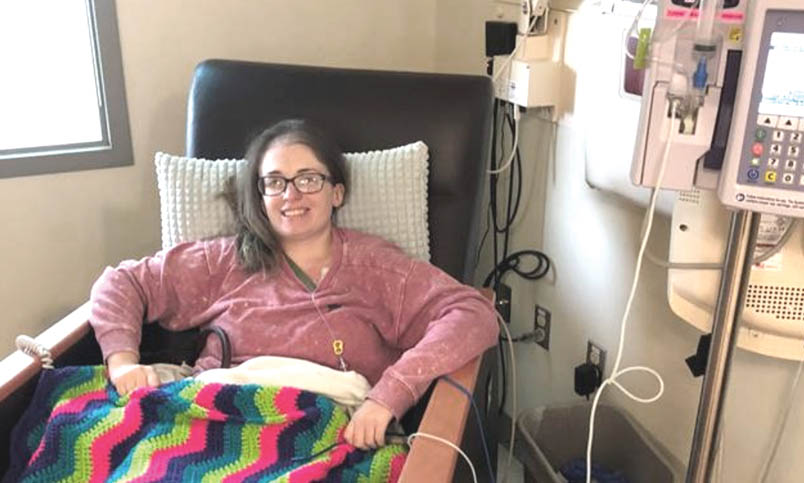
Larae Sorrels of Enid was 27 years old when she started experiencing what she thought were just terrible menstrual cramps. She went to see several OB/GYNS before a mass was discovered obstructing her bowels. Sorrels admits at first, she didn’t really think much of it. “I thought finally I knew what was causing my problems. I thought they’ll remove the mass and that will be the end of it. Never in a million years did I think it was cancer.”
Sorrels was diagnosed with stage three colon cancer. She confesses, it was a hard pill to swallow. “There was a lot of anger. I remember thinking this is an old man’s disease and here I am in my twenties being forced to wear a colostomy bag.”
Larae has no family history of cancer and never even knew anyone with cancer, so she was truly blindsided by the diagnosis. “I had just been accepted to nursing school in Kentucky. Then two days later I was being admitted into the hospital,” remembers Sorrels. “I thought my life was ruined and I sank into a very dark place.”
“Nobody knows for sure why colorectal cancer numbers are rising in young people,” says Sumbal Nabi, M.D., with the INTEGRIS Cancer Institute in Enid. “A sedentary lifestyle, high blood sugar, vitamin D deficiency and eating a lot of red meat have all been associated with the disease. Heavy alcohol use and conditions such as type 2 diabetes are also possible causes.”
She adds, “When someone is diagnosed with cancer at a young age, people automatically suspect genetics, but experts still haven’t been able to use genetics to explain the surge.”
Sorrels says eventually she was able to pick herself up, dust herself off and give herself an attitude adjustment. “I could have stayed mad at the world, but I finally realized that everyone goes through hard stuff. I told myself I had a decision to make. I could choose to stay down, or I could choose to make the most of the situation and crawl my way out. I chose the latter.”
Sorrels enrolled in the nursing program at Northern Oklahoma College. She attended class all through her treatment, even carrying her medicine pump with her around campus.
Instead of the 12 rounds of chemotherapy she was initially prescribed, Larae ended up only needing eight. She has been in remission since Dec. 2019. She says the entire experience will make her a better nurse. “I feel like I will be able to relate to my patients because I’ve been there,” Sorrels proclaims. “I can help them see past their current circumstance and see a brighter future.”
She continues, “Even if I could go back and change what has happened to me – I wouldn’t. It was a tough road, but it led me to some great things.”
Sorrels is now cancer free, in a serious relationship and will graduate nursing school in May 2022. She hopes her story will serve as an inspiration to someone out there who needs it.
Colon cancer can take many years to develop, so early detection is key. Starting at age 50, you should schedule your fist colonoscopy. And if you are of African American decent or have certain hereditary conditions, you may need to start much sooner.
People with a first degree relative with colon or rectal cancer should begin screening colonoscopies at age 40 or ten years before the diagnosis of the relative, whichever comes first. To schedule a colonoscopy today, visit integrisok.com/colonoscopy.
SITUATION UPDATE: COVID-19
* As of this advisory, there are 437,974 (121 new today) cases of COVID-19 in Oklahoma.
* 334 is today’s 7-day rolling average for the number of new cases reported.
* Today’s Provisional Death Count (CDC/NCHS): 7,846
* Additional hospitalization data can be found in the Hospital Tiers report, published evenings Monday through Friday.
* Register online to receive a notification when you’re eligible to schedule a COVID-19 vaccine appointment at vaccinate.oklahoma.gov, or locate other vaccine opportunities at vaccinefinder.org.
* For more information, visit https://oklahoma.gov/covid19.html.
*The total includes laboratory information provided to OSDH at the time of the report. As a result, counts are subject to change. Total counts may not reflect unique individuals.
***The purpose of publishing aggregated statistical COVID-19 data through the OSDH Dashboard, the Executive Order Report, and the Weekly Epidemiology and Surveillance Report is to support the needs of the general public in receiving important and necessary information regarding the state of the health and safety of the citizens of Oklahoma. These resources may be used only for statistical purposes and may not be used in any way that would determine the identity of any reported cases.
Data Source: Acute Disease Service, Oklahoma State Department of Health. *As of 2021-03-30 at 7:00 a.m.
LOOKING BACK: ‘TV Therapy’ for classic television stars
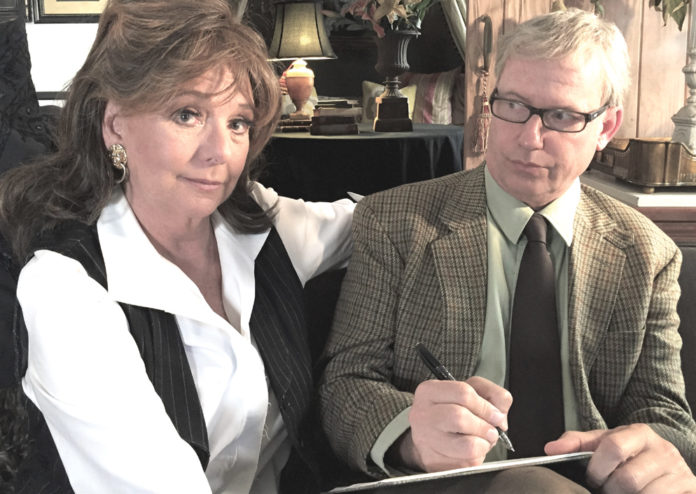
By Nick Thomas
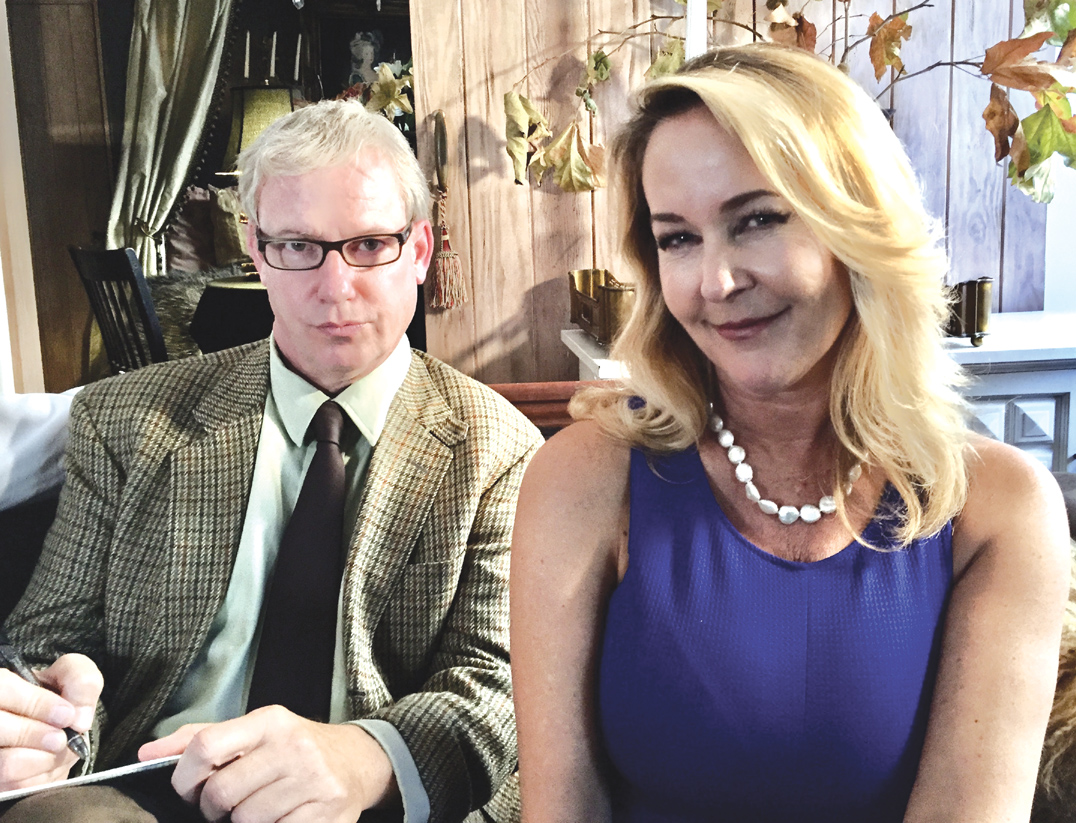
Back in 2019, actor/writer/producer Terry Ray convinced Erin Murphy – best known for playing baby Tabitha in “Bewitched” – to reprise her role in a short five-minute web skit in which her now-adult character seeks out a therapist (played by Ray) to deal with childhood issues lingering from growing up as the daughter of Darrin and Samantha Stephens. It was the beginning of a web series called “TV Therapy” that has delighted fans of classic television.
“One day my dad came into the room and he was a completely different person,” proclaims Tabitha to Dr. Stephen Nielson, Ray’s therapist character in the series. Fans of “Bewitched” will immediately understand the humorous implication.
Ray followed up with another fun therapy session featuring Dawn Wells as Mary Ann of “Gilligan’s Island” fame discussing her issues resulting from the harrowing years stranded on a desert island. The series is available on Ray’s YouTube channel.
“Don’t ever take a vacation in Hawaii and if you do, don’t take the harbor cruise,” advises Mary Ann from the therapist’s couch.
“We shot the ones with Erin and Dawn in the home of Billy Clift, the director, pre-COVID,” explained Ray from his home in Palm Springs. “Then COVID hit, but they were so much fun I wanted to do more and realized I could via Zoom.”
He followed up in 2020 with episodes featuring Butch Patrick (Eddie from “The Munsters”), Kathy Garver (Cissy from “Family Affair”), and others.
“I’m a classic TV fan and came up with the therapy sessions as a fun way to explore the characters today,” said Ray who wrote all the scripts. “I had no budget and don’t make any money from the series – everyone volunteered their time because we knew how much the fans would enjoy it.”
Ray was devastated when he learned of Dawn Well’s death from COVID in late December last year. The two became friends after he wrote and appeared in the short 2015 film with Wells, “She’s Still on That Freakin’ Island,” in which Ray’s character is washed ashore to find Mary Ann still a castaway.
“With the stress of COVID I, like so many, found comfort tuning in to classic television – the shows that made us feel happy and safe in our youth and still do,” said Ray. “On a sad note, ‘TV Therapy’ was one of the very last performances of the wonderful Dawn Wells before we lost her to COVID. Dawn really embraced the role of Mary Ann and helped keep the show alive for fans for 50 years.”
Ray plans to keep classic TV show memories alive for fans, too, by continuing his “TV Therapy” series in 2021 (see www.terryray.tv).
“I’ve got new shows planned and written, and hope to keep it going for several more seasons.”
Nick Thomas teaches at Auburn University at Montgomery, Ala., and has written features, columns, and interviews for over 850 newspapers and magazines. See www.getnickt.org.
This too shall pass: How death teaches us life
story and photo by Bobby Anderson, Staff Writer
Elizabeth Rogers has experienced a lot in a short period of time.
A Chiara malformation – often detected after birth – led to brain surgery later in life for Rogers, a mother of two and registered nurse.
A defect in the base of her skull allowed brain tissue to slip into her spine.
Severe headaches and neck pain led to her losing range of motion.
She could barely turn her head. The pain was unbearable.
“During the moment having that severe pain I knew there was no way I could live my life,” she said.
At the time, it seemed as if her life might be over, even though she’d only been on this earth for nearly four decades.
“Now I just feel so much better. I’m so thankful they had an operation that would actually help and not live in pain on a daily basis,” she said, looking back at the November 2019 surgery.
So at a relatively young age, Rogers had already faced what she thought might be the end.
The experience, which spawned resilience and perseverance gave her a newfound lease on life.
One she promised she wouldn’t squander.
Growing up, Rogers always wanted to be a doctor. There was something about healing others that drew her.
Growing up with a respiratory therapist for a mom, Rogers knew the hands and feet of medicine truly were at the bedside.
A lunch meeting with her mom at the hospital cafeteria solidified her path.
“Just that moment I realized my heart was in healthcare,” she said.
A nurse since 2004, Rogers has poured her passion into helping others facing their end as a clinical manager for TenderCare Hospice in Norman.
“I like to serve people. It’s my passion to help others,” she said. “I just like to take care of people.”
Owner Brian Wilson ensures that caring for seniors is the company’s passion.
As a Medicare-certified agency, the company’s focus is solely on creating comfort for both patients and their families.
Tailoring care plans to the specific desires and needs of patients is first priority, while also preparing families for the road ahead.
Compassionate nurses, aides, social workers, chaplains and volunteers are available 24-hours-a-day for on-going support. With an extensive geographic service area covering 29 counties and ability to deliver care at home, nursing home, or assisted living center, TenderCare Hospice is the choice of doctors and families across Oklahoma.
“Being a hospice nurse has really changed my outlook on life in general,” she said. “I had never had elderly care on my radar ever but when my kids got into school I thought I would try home health.
“From there, I just grew fond of the elderly. They can give you so much.” The prospect of entering hospice care frightened her.
“Once I got into it I can’t imagine doing anything else with my life,” she said. “These patients give you so much. It’s just amazing.”
“They thank us for what we’ve done but really it’s us that need to thank them. You learn that even though you’re going through hard times you’re going to get through it.”
Learning the stories behind each individual are some of the best parts of Rogers’ profession.
The joys, failures, successes and sorrows add depth to others’ lives.
“You realize they’ve gone some of the same stuff you have to go through whether it be financial, health, loss. Then you realize you’re going to be able to make it,” she said. “They teach you what life is really about.”
Rogers always tells her new nurses there’s no way you can understanding living without helping someone die. And learning how they live adds depth to your own life.
“Stories like that bring a whole lot to your life,” she said. “You realize you can get through this. This is not going to be the death of me. Other people have gone through this and it’s going to be OK. That’s probably the thing I enjoy the most about hospice, getting to know the people and learning from them.”
“It’s just an amazing field.”




